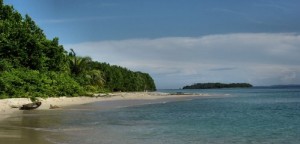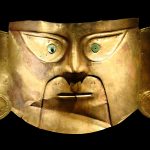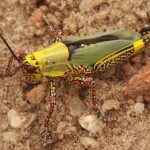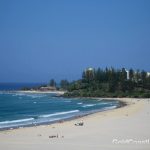 John M. Edwards succumbs to the lures and snares of Costa Rica’s Caribbean “ecotourism,” instead of “narcissism,” in a relatively wealthy country translating literally as “Rich Coast.”
John M. Edwards succumbs to the lures and snares of Costa Rica’s Caribbean “ecotourism,” instead of “narcissism,” in a relatively wealthy country translating literally as “Rich Coast.”
I stood in a state of stupefaction, eavesdropping on a few randomundocumented locals who looked like they were engaging in a slapping fight—except with warm smiles of nonrecognition on their faces, maybe ganja buzzes.
“Hey, mon, wha’appen!”
“Wa’appen, wha’appen!”
“Murder she wrote, nanana, murder she wrote!”
“Wha’appen! Whaaaaa’appen!”
I decided here on the Caribbean coast of Costa Rica (“Rich Coast”), everyone said what they wanted, without being taken to account. Each morning really is a brand-new day in a region of mostly wildly friendly Christian evangelicals.
“Creole” is way different throughout the gossip-loving African continent, in each and every country, from where I gathered this group surely originated.
But obviously, no cab drivers here actually spoke English: they were just “pretending” they could understand each other.
“Yam mon, yah mon!”
“Woke up zis moning drinking for brekso!”
“Wha’appen!”
“Yah, mon, yah mon!”
The pseudo-doowop quartet kept flapping their hands in midair collisions resembling inaccurate high fives. “Wa’aaaaaaaaaaaaaaaaaaaaaapen!”
And then it finally occurred to me that these recent illegal escapees from the cargoholds of luxury cruise ships, transporting tourists and toot, really, really, really couldn’t understand each other.
I mean: at all.
“Wha’appen!”
“Wha’appen!”
“Wha’appen!”
“Wha’appen!”
And yet I held up my spider-shaped hand, and one of the Rastas snapped to attention, elegantly motioning me over to his taxi.
Aha! Service with a smile.
Sometimes anonymous strangers who don’t speak English, French, Dutch, Danish, Portuguese, or Spanish by sheer dint of the preposterous make even better travel mates: imported brothers with no need even for light conversation. Eyes open, brain pulsating at a minimum. “Ya, mon, wh’appen, ya got to lively up yourselves, Bob Marley wanna be a miser, Bob Marley gonna be a kaiser! Giveitawaygiveitawaygiveitaway now!”
Or something more or less along those lines, indecipherable reggae blasts of blarney.
I no longer felt like a white Casper Ghost.
I felt like a real space alien trying to decipher a code.
As a fresh arrival (“new blood” in Costa Rican argot), I felt absolutely elated in the flowery fragrant atmosphere and blessed winter sun.
Still trapped in a long cab ride into the virtually unknown city of coastal Cahuita, I recklessly joined in, “Underneath the mango tree, me honey and me go for the moon: underneath the mango tree me honey and me make sulu look good: mango, banana, and tangerine, suki and aki, and cocoa bean. . . .”
The taxi driver listened in respectful silence, then squawked like a West Indian “jumby” (ghost of the donkey), “Hey, mon, you know dis song?!”
“Yeah, it is from ‘Doctor No,’ a James Bond film.”
The driver almost veered off the road he was laughing so hard. “James Bond. James Bond? James Bond! You are James Bond?!”
“Ahahahahaha!” Laughter, replaced relief.
“Bwahahahaha! He be in the wrong place!” the driver replied.
In “collitch” in New Orleans, I took a linguistics course which included African-American black slang, featuring the “consuetidinal be”—which made it easier to translate the cipher of convo abroad, rather than just the cenotaph of sign language, bumping fists, and too-frequent smiles. “I be here in the first place,” I tried like a call-and-response spell.
I don’t want to frighten you, but I am also “Tom James, Zagat Reviewer,” here in Central America to diagnose which restaurant shack had the most delicious conch fritters. (Tom James rules the planet with an iron fist!)
That’s right, real life hardly ever makes any sense, especially when you are on vacation high on “exaggerated hyperrealism” ™, a literary genre of my own invention.
Even stranger, this taxi man, who resembled a cigar-smoking baseball player or African singer Ishmael Lo, mentioned he did not like basketball players (one of whom owned a pricey villa on his homeland demesne). This I gathered because apparently the taxi man spoke a little “Nacht Muzik.” (The Germans never colonized a single Central American prop.)
As nightfall spread like a purplish bruise across a prizefighter’s face, the taxi driver turned on his high-beam headlights swerving past oncoming traffic in a hootenanny of horns, and then he said, “Mehr Licht”! (I had to look this up later in a German-English dictionary and landed on “More Light”!)
“Mehr Licht! Mehr Licht!”
This amusing a capello scene replays itself in every country in the world whose main source of income lies in idleness and tourism, and by every “ethnicity,” talking about everybody behind their backs in a nonsense jabberwocky language called “pidgin.”
Come on, nobody would waste their time now promoting a universal language called “Esperanto,” when they can strike up a conversation with anybody without even having any word in common in any lexicon. Even if you get only clicks in response to your unanswerable queries, things are usually good here in the carefree Caribbean coast of Costa Rica (“Rich Coast”).
English and French speakers can just almost barely catch the gist. Rich tourists are to be made fun of and to overtly fleece—but not too much. Yes, Caribbean poet Derek Walcott (author of Omerous) would not be laughing right now. As a philosopher, whom I mistook for friendly “local color” on my travels in the Caribbean, bruited way beyond any doubt, “There is only one race: the human race!”
After I arrived at Cahuita, I ingratiated myself to the local populace, who all obviously knew each other and had a tendency to stare. Then I befriended several fellow backpackers at my beachfront hotel.
We walked around.
“Look, over there: a real witch!” one of my new friends said excitedly.
The English barrister (lawyer) named “Tim” sounded excited. “I know she is a witch because one of the local Ticos [Spanish Costa Ricans] pointed her out—to avoid.” Tim was rather short, not a midget, mind you, but vertically challenged, even among the slight native Carib Indians, including the Bribri and the Taino.
Tim’s travel pal, another barrister named “Nigel,” looked bored andblasé—even a little embarrassed. “Yeah, I guess so,” Nigel offered, looking for moral support from his hotbod Californian surfer-chick galpal.
I twisted my neck around like a hoot owl looking at the dusky caramel-colored voodoo queen with a head of long snaky Medusa-like dreadlocks, and a real live sloth wrapped like a fur stole around her neck.
“That’s amazing. . . .”
The haughty voodoo queen ignored my comment and entered the “soda” (Costa Rican Spanish for “eatery,” not Coke ™ or Pepsi ™), featuring a corrugated iron roof upon which rain pounded like a maniacal coked-out conga drummer, especially here during the wet season.
But I was in no mood for a squall: instead, I wanted a squaw.
You know, a lovely copper-complected Native Centro Americana, to smoke tobacco with and shake hotsauce on. Here in a discreet village epicenter on the rich coast of Costa Rica–(the Eastern Caribbean West Indian side: does that make sense?)–I followed the sexy voodoo queen and sat down for a “tipico” plate of rice and beans covered with coconut sauce. Plus, a few Salva Vida “cervezas” (beers).
If we have already visited Costa Rica’s Pacific West Coast, shelled for the tourist trap Manuel Antonio or pinched pesos at the backpacker haven Montezuma, there is a big surprise waiting for you on your next trip.
I already told you.
So say goodbye to the Monteverde Cloud Forest and Arenal Active Volcano, then make your way to this (discreetly located) Caribbean paradise with a reggae vibe that doesn’t involve a scary prop-plane flight or aggressive luggage customs search.
In fact, although I had already depended on haggling with a long-haul taxi from the capital San José, as I recounted for you at the start of this essayistic epistle written on a series of postcards to nobody yet in particular, you can take a cheap slow public bus to this non-island West Indian enclave, arriving in time to be surrounded by real red-eyed Rastafarians, who claim a legal right to smoking the ganja for religious reasons, later in the day.
Waking up one day in Cahuita after several lazy days of listening to geckos (more reliable than any alarm clocks), with three dreadlocks growing (they form naturally by not washing your hair), I set off to meet the locals, feeling a little inferme.
Stumbling into town with a hangover, I discovered that most Rastaswear fake dreadlocks gleaned from the local curio shops in town, all blasting Bob Marley favorites all at once:
“No woman, no cry, no woman, no cry!”
“Exodus, movement of Jah people!”
“We’re jamming, jamming, I want to jam it with you!”
“I shot the sheriff, but I did not shoot no deputy!”
“Get up, stand up, stand up for your rights!”
“You’ve got to lively up yourself!”
“Them belly full but me hungry!”
A couple of weeks later, inside my cabina (cabin), just a short walk away from the playa (beach) starting at the entrance to the Cahuita National Park, I doffed my swimsuit and packed my “doss bag” with beach essentials, feeling like I was from the “Grand Castillo de Jagua.”
I took a short huff on the footpath hacked out of the primary rainforest crowning the strand like a magic-realism Indian headdress, filled with cantankerous howler monkeys peeing on me.
On a mighty fine beach there, I plopped down and decided I never wanted to leave, my skin burning under the scorpion-sting rays of the awesome sun.
Walking around the intentionally rough roads, to keep too many backpackers with Lonely Planet Guides on the so-called Gringo Trail at bay, I noticed that many of the “Import-Export” expats (an international euphemism for “chronic unemployment”) had the sniffles.
Until I reckoned I had just glimpsed a white residue, probably just powdered sugar, rimming the nostrils of an overtalkative British dolebludger named “Rupert, the Public Schoolboy.” Now Rupert resembled ex-SNL (“Saturday Night Live”) sketch comedian Mike Meyers, but with a Rapunzel-length Rastafari blond wig mop.
“Guess who’s coming to dinner, Natty Dreadlocks!” Rupert, alias “Maybe Mike,” sang along to a popular Burning Spear song.
Wasted, I sang along also, “Guess who’s coming to dinner, Natty Bump0!”
“Got.” Apparently, “Maybe Mike” had read The Last of the Mohicans.
“Leatherstocking series. . . .” Rupert clarified, adding that he was Oxford-educated.
I added in a singsongy falsetto, “Found some sensimilla, put it in my
pocket!”
Which was basically the same song, mirrored mood, comparable rhythm, identical chord chops—unintentionally sampled with alt lyrics, albeit.
Now Rupert was laughing like the crazy howler monkeys unpeeling bananas in the trees, bowling over and grabbing his stomach filled with white maggots, the laughter evidently hurting so much.
Back at the cabinas, a pride of travelers lollygagged in the hammocks engaged in a long conversation about why people travel, until a coincidence popped up.
Nigel said he was from a small town near Manchester.
“I have a friend from Darby Dale,” I said.
“Really?! That’s where I’m from!”
“Really?! Do you know Mandy Greatorex, the pagan pop singer from Aquamanda?”
“Yes, I know her quite well!”
“So do I! I met her in Australia and bumped into her by chance in England and The States!”
I’ll end right somewhere near here on an upbeat.
(Blank the practical info sidebar.)
Ah-ha, a postcard instead: “Hi Mandy! Greetings from Cahuita, Costa Rica! You’ll never guess whom I just bumped into. Your barrister friends: Tim and Nigel. Small world, eh?”







Leave a Reply